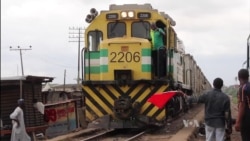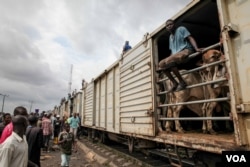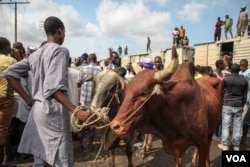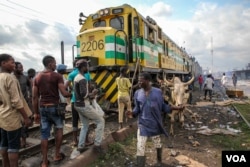Exactly 36 hours after it left a northern Nigerian town, a freight train brimming with cattle and sheep rumbled into the Oko-Oba slaughterhouse in Nigeria’s economic hub, Lagos.
Nothing like it had been seen in 30 years.
When Nigerians need to get themselves or their possessions around, they mostly turn to buses, trucks and cars, but those can be unreliable in a country that suffers from decrepit roads and intermittent fuel shortages.
The shipment of cattle by train from the northern town of Gusau to Lagos is being called a milestone in the country’s quest to revitalize its railway system.
“The reliance on road has been too much over the last few years,” said Niyi Alli, director of operations for the Nigerian Railway Corporation. “The readymade alternative is right here, which is the train. The issue has been whether the train will be reliable. It is now reliable. Is it available? It is now available.”
Train tracks crisscross Nigeria, most of which were built by British colonizers. They fell into disrepair in the decades since Nigeria gained independence in 1960.
Most Nigerians instead rely on the country’s roadways to get themselves and their goods around. The National Bureau of Statistics says roads make up 90 percent of Nigeria’s transportation sector.
While some roads in Nigeria are well paved, many of its major trade routes are filled with potholes, or lined with security checkpoints that some travelers say are just avenues for bribe-taking by local officials.
Nigeria has tried many times to get its railways in order.
Those efforts began bearing fruit in recent years, such as in 2012 when a passenger rail line restarted between Lagos and Kano, the northern city that’s the country’s second-largest.
This year, a new rail line linking the capital Abuja to the city of Kaduna opened. But those efforts are for moving people.
Sulyman Dauda says Oko-Oba relies on a stream of trucks to supply cattle. But that flow is unreliable, and often brings in cows that are injured from the hours on the road.
“Sometime there will be traffic on the roads. Other times, cars will break down and arrive late,” he said.
When cattle herders aren’t bringing their cows to market in trucks, they move them on foot around the country in search of grazing land. This has caused conflicts with farmers, who accuse herdsmen of trampling their crops. Dozens of people have been killed in clashes between farmers and herdsmen across the country this year.
Encouraging the transportation of cattle by rail is meant to help solve these problems.
Many at the slaughterhouse greeted Saturday’s arrival of 15 cars of cows and sheep with jubilation, but kinks remain to be worked out.
Oko-Oba lacks a formal platform for unloading animals, so the cows were led off the train cars on wooden planks. Crowds gathered around the train in a field of mud and broken pieces of wood and plastic, the remnants of shacks that had recently been demolished to make room along the railroad tracks.
Cattle dealer Tahir Jibrin Kabir said the cows he inspected were in better shape than those brought in by truck.
“We can benefit from it in two ways. In the transportation, low cost of the transportation, and in the health of our cows,” he said.
Alli said the train would make its return journey filled with fertilizer. He expects it to return every week to Lagos with more cattle.
















